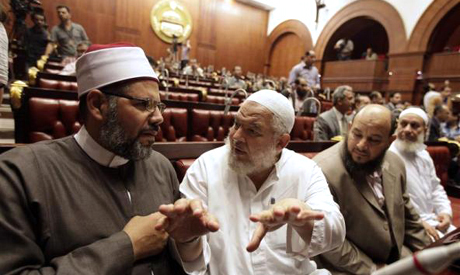 The role Islamic Sharia law in Egypt's new constitution continues to stir controversy almost a week after the Constituent Assembly released its first official draft of the national charter.
The role Islamic Sharia law in Egypt's new constitution continues to stir controversy almost a week after the Constituent Assembly released its first official draft of the national charter.
Essam Derbala of the Al-Jamaa Al-Islamiya's Building and Development Party told Al-Ahram daily newspaper on Tuesday that his party wanted Article 2 of the draft constitution, which specifies the role of Islamic Sharia law, to be changed.
Article 2 currently states that the "principles" of Islamic Sharia law are the main source of legislation. Derbala said he wanted the wording altered so "Islamic Sharia" is the source of all legislation in the country.
Derbala added that if the term "principles" was maintained its meaning would have to be explained clearly within the charter.
Muslim Brotherhood spokesperson Mahmoud Gozlan confirmed to Al-Ahram that an additional explanatory article about the term "principles" had been included in the draft.
"The additional article was approved by all political forces, including liberals, secularists and Nasserites," said Gozlan, who added that the additional article was drafted by a number of prominent scholars.
Prominent Salafist leader Yasser Borhamy has threatened to call for mass protests if Article 2 is not changed.
National Association for Change (NAC) general coordinator Ahmed Bahaaeddin Shaaban has condemned such threats of mobilisation by Salafists as "an undemocratic tactic used by the religious current to pressure society."
"The Islamic current wants an article in the constitution that only reflects its own ideas and interests," Shaaban claimed.
He urged members of the Constituent Assembly to give up on "extremism and stubbornness" and keep Article 2 unchanged.
Egypt's Supreme Administrative Court is expected to begin looking into legal complaints against the constitution-drafting body on Tuesday. Several lawsuits have been filed challenging the assembly's constitutionality and the mechanisms employed for selecting its members.
The Supreme Constitutional Court ruled in June that the law that regulated last year's parliamentary polls was unconstitutional. This led to the dissolution of the People's Assembly (the lower house of Egypt's parliament), which had appointed the Constituent Assembly's 100 members.



